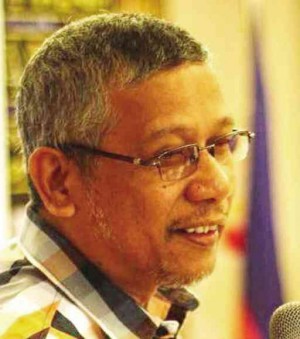
DR. BENITO Molino leads the campaign against destructive mining operations in Zambales province. CONTRIBUTED PHOTO
STA. CRUZ, Zambales—A doctor is at the center of the growing tension over mining operations in Sta. Cruz town in Zambales province for leading a campaign to heal what he calls a “bleeding environment.”
Dr. Benito Molino, known as “Doc Ben” to residents here, has been at the receiving end of criticisms from supporters of mining companies in the province. Mine workers have blamed Molino for the suspension of mining activities in Sta. Cruz that cost them their jobs.
Molino, 57, is chair of the Concerned Citizens of Sta. Cruz, Zambales (CCOS), one of the antimining groups in the province that has been assailing mining companies for what his group calls “irreparable environmental destruction.”
He is also an active volunteer and member of Medical Action Group Inc., a health and human rights organization, and an expert in forensic medicine.
For more than three years now, Molino and his group have been campaigning for the cancellation of mining permits and rehabilitation of areas damaged by mining operations in Sta. Cruz.
“I’m not only a doctor to people. I also want to make sure that our environment is not ailing because people are the ones who will suffer the most if the environment is bleeding,” Molino said.
On July 15, the Mines and Geosciences Bureau (MGB) regional office in Central Luzon suspended the operations of four mining companies that extract nickel laterite in the province, citing their “unsystematic mining or stripping method.”
The MGB’s suspension order came two months after it sent a multidisciplinary team to Sta. Cruz to inspect the mining activities there.
Molino and his group consider the suspension order as a victory for Sta. Cruz residents who, they say, have been struggling to revive their sources of livelihood, which are mostly farming and fishing.
Molino said nickel laterite (soil layer rich in nickel compound) has silted the rivers, creeks, fishponds, shorelines and farmlands in their town.
“Most families of farmers are now suffering. They have less food on their table and their children have to stop schooling,” he said.
The average rice yield, he said, went down from 100 to 70 sacks a hectare while fishpond owners lose at least P100,000 a hectare in every harvest.
In April, Molino led about 300 Sta. Cruz residents in staging a protest rally denouncing mining activities in their town and pressuring government agencies to probe the alleged violations of mining companies.
He said his group’s antimining campaign has paid off when MGB suspended the operations of four mining companies in the province.
But mining workers are not taking CCOS’ victory sitting down as about 1,000 of them held a protest caravan on Aug. 9 to win back their jobs.
“The fate of more than 3,000 workers, mostly from Sta. Cruz, now hangs in the balance after the MGB and EMB… suspended the operations of the four mining companies,” Orlan Mayor, spokesperson of the Coalition of Mine Workers, Families and Communities (CMWFC), said in a statement.
“What will happen to all of our families now that we don’t have jobs?” he said.